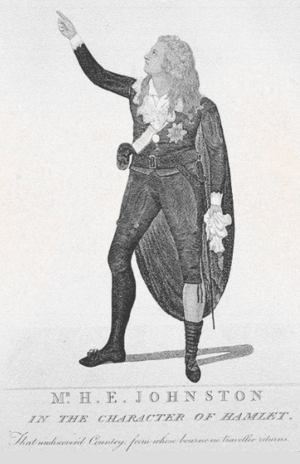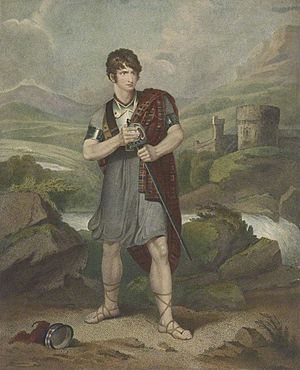Henry Erskine Johnston facts for kids
Henry Erskine Johnston (born 1777, possibly died 1838) was a famous Scottish actor. People often called him The Edinburgh Roscius. This was a special nickname, comparing him to a very famous Roman actor named Roscius. Henry was known for his amazing acting skills.

Becoming an Actor
Henry Erskine Johnston was born in Edinburgh, Scotland, in May 1777. His father used to be a barber on the High Street. Another story says his father, Robert Johnston, ran an oyster restaurant next to the Theatre Royal.
Henry first trained to be a lawyer, but he did not like it. Then he worked for a linen shop for three years. He loved acting more than anything. His first time on stage in Edinburgh was as an amateur actor. He played Prince Hamlet on July 9, 1794.
In 1797, a famous actor named Stephen Kemble noticed Henry. Henry was reciting a poem called "Collins Ode on the Passions." Kemble became his acting teacher and helped him a lot. Henry became very successful right away. After performing in Edinburgh, he went to Dublin, Ireland. There, he acted for twelve nights, often playing Norval in the play Douglas.
Acting in London
Henry Johnston made his first appearance in London at the Covent Garden Theatre. This was on October 23, 1797, and he again played Norval in Douglas. Critics in the European Review praised his performance. He stayed at Covent Garden for several years. During the summers, he also performed at the Haymarket Theatre.
Henry and seven other actors had some disagreements with the management at Covent Garden. After another actor, Joseph George Holman, was let go, Henry was able to get his job back. This was thanks to John Fawcett, who refused to sign his own contract otherwise.
On September 15, 1803, Henry performed at Drury Lane Theatre. He played Norval in Douglas again. On September 22, he played Anhalt in Lovers' Vows by Elizabeth Inchbald. His wife played Amelia in the same show. He stayed at Drury Lane for two years. During this time, he played many roles, including Petruchio and Duke Aranza in The Honey Moon. He returned to Covent Garden on October 13, 1805. There, he was the first actor to play Rugantino in Monk Lewis's play Rugantino.
Later Career
Henry Johnston returned to Covent Garden on December 10, 1816. He played Sir Archy Macsarcasm in Love à la Mode. This was his first time back there in twelve years. He also played Sir Pertinax Macsycophant in The Man of the World on December 27. On June 10, 1817, he was the first to play Baltimore at the English Opera House. This was in a musical version of The Election. His last known performance in London was on November 24, 1821. He played the Solitary in Le Solitaire, or the Recluse of the Alps.
In early 1823, Henry became the manager of the Caledonian Theatre in Edinburgh. He opened the theatre on January 11, 1823, with the play Gilderoy, the Bonnie Boy. He played the main hero and also wrote a speech for the opening night. He performed in other plays, like Jerry Hawthorn in Tom and Jerry. However, he stopped being the manager on April 7, 1823. On October 20, 1830, he performed for four nights at the same theatre. After that, he went back to London.
Some of his most important roles included Douglas, Count Romaldi in Tale of Mystery, George Barnwell in The London Merchant, and Alonzo in Pizarro.
In 1838, Henry sailed to the United States with a circus owner named Andrew Ducrow. After that, no one heard from him again.
Family Life
In 1796, Henry Johnston married Nanette Parker. She was born in 1782. They had six children together. Nanette first saw Henry acting in a play called "The Storming of Seringapatan" at the Theatre Royal, Edinburgh. She was only 14 years old and fell in love with him right away. They got married shortly before her 15th birthday.
Nanette also became an actress and performed with her husband in Ireland. She played Lady Contest in The Wedding Day and Josephine in The Children in the Wood. She performed as Ophelia to Henry's Hamlet at the Haymarket Theatre on September 3, 1798. She repeated the role at Covent Garden on September 17. She played both funny and serious roles, including Lady Macbeth.
A writer named Thomas Gilliland was sad when Mrs. Johnston stopped acting. He praised her performances as Lady Randolpha Lumbercourt in The Man of the World and Lady Caroline Braymore in John Bull. Later in life, she and Henry separated. A book called Dramatic Biography said that she was no longer acting.
 | May Edward Chinn |
 | Rebecca Cole |
 | Alexa Canady |
 | Dorothy Lavinia Brown |


